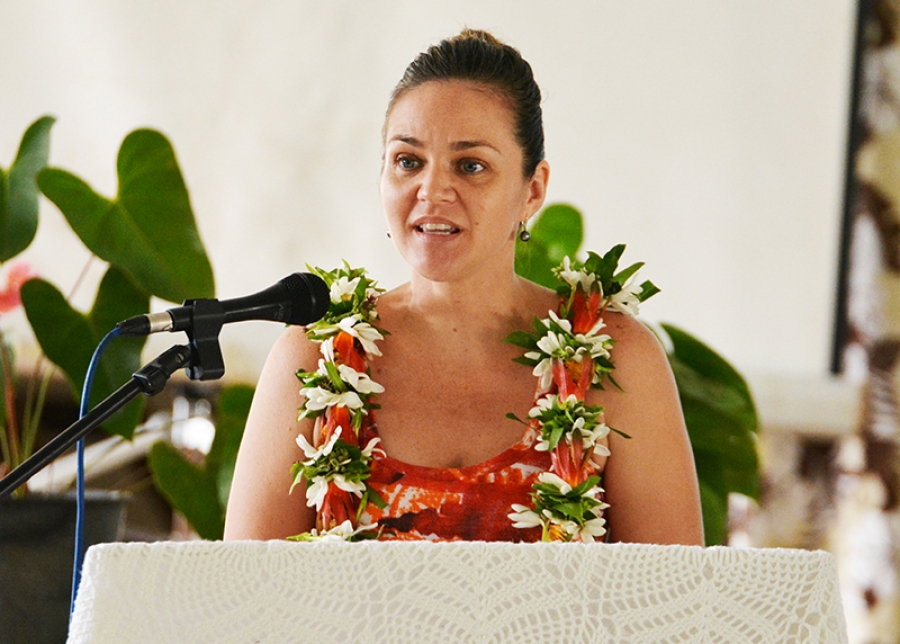It’s still pilot phase: Education ministry defends low NCEA scores
Wednesday 27 December 2023 | Written by Rashneel Kumar | Published in Education, National

Education ministry secretary Danielle Tuangane-Cochrane. PHOTO: CI NEWS/18060505
The Education ministry is defending the Cook Islands’ poor performance in the latest National Certificate of Educational Achievement (NCEA) literacy and numeracy tests, arguing that they are still in pilot phase.
Of the 242 Cook Islands and Niuean students who took the new tests in June, only 18 per cent passed reading, 45 per cent passed writing, and 23 per cent passed numeracy.
And Michael Johnston, an education researcher from think tank, the New Zealand Initiative, warns that making the literacy and numeracy tests mandatory in 2026 could trigger a sharp decline in NCEA pass rates for Cook Islands students.
Johnston said it’s important to certify literacy and numeracy but a big drop in NCEA achievement rates is not desirable.
“We need to look at an alternative way of approaching this for both the realm countries and New Zealand,” Johnston told RNZ Pacific. “What I would advocate would be establishing a standalone certificate of literacy and numeracy and not having it be a co-requisite for NCEA.”
Cook Islands results improved on when they took them in 2022, which had a 17 per cent pass in reading, 16 per cent in writing, and 17 per cent in mathematics.
But Johnston said he did not see a reason why there would be much improvement going forward.
“Even though (New Zealand’s) results are better than (the realm nations), when kids come to depend on these to get NCEA we’re going to have a bit of an issue.
“In the realm countries, it’s going to be worse that, the achievement would fall through the floor.
“The reasons for these kinds of problems exist go back to primary school, so I don’t expect a big improvement in the next couple of years.
“We need a hard look at how these skills are being taught much earlier.”
Defending the low pass rates, Danielle Cochrane, the outgoing Cook Islands Ministry of Education secretary, emphasised that the literacy and numeracy assessments are still in the pilot phase.
Cochrane argued that subjecting a pilot programme to media criticism based on achievement rates is “unfair”, both in the Cook Islands and across the realm countries.
“Our Cook Islands NCEA schools piloted for a range of reasons. The Ministry, together with our NCEA schools, viewed the NCEA Pilot as a means to test and prove the viability of proposed changes within our setting – this is still the case. The pilots have provided our schools with an opportunity to consider the assessment environment and the capabilities of our system,” Cochrane said.
“Some schools entered entire cohorts of students, others entered selected groups, but all entered on the premise of giving our students an opportunity.
“… it should be noted that New Zealand students have also struggled with the pilot literacy and numeracy assessments, not just realm countries.”
New Zealand students have struggled with the tests too, with failure rates as high as 44 per cent in writing and maths in June.
Titikaveka College principal Vae Unuka attributed the Cook Islands’ low pass rates partly to cultural and language barriers, particularly difficulty interpreting the literacy question
“We are finding that some of our kids, the question is too hard for them to understand and to really solve it,” Unuka told RNZ Pacific.
“We will be looking at our results and then reviewing it again, finding strategies of how we can tackle that in the future.”
Unuka said the literacy tests were done on paper but the numeracy test was a digital assessment. He said this was also a challenge because some of the students were slow at typing.
New Zealand Education Ministry Curriculum Centre general manager Rob Mill said a two-year transitional period in 2024 and 2025 will give schools time to adjust to the new tests.
Mill said during the transition additional standards will be available in local languages to students living Niue, Tokelau and the Cook Islands.
Cochrane said: “Our Ministry and schools continue to work very closely with the New Zealand Ministry of Education in preparation for the NCEA changes. This collaboration is mutually beneficial, respectful of our unique Cook Islands context, and will remain as a prioritised work stream going forward.”
“The approach of this collaboration is not top-down nor is it the sole responsibility of a professional development specialist being flown in from New Zealand. Preparedness at this level is centred on building the capabilities to respond to and sustainably support the proposed NCEA changes from within the Cook Islands.
“Naturally this will consist of professional development and learning opportunities, and ongoing participation in subject expert groups for our teachers.”
- Rashneel Kumar/Caleb Fotheringham of RNZ Pacific















































Comments
Te Tuhi Kelly on 28/12/2023
How long's a string, well, how longs a pilot scheme. Kids develop at different levels, different environments, different stimuli, different home settings and hence trying to buttonhole them into an education system that is clearly not meeting their needs and is designed to lump them all under one umbrella education outcome but the needs of the educational statisticians is doomed to failure. Each child should have an educational capacity needs assessment to identify what their strengths and weaknesses are and then tailor the education towards that need. Of those stats I suspect that the girls are higher in those stats than the boys and that begs another comment.......later.